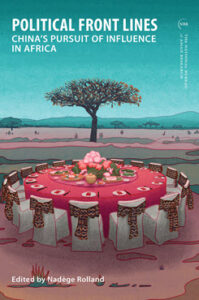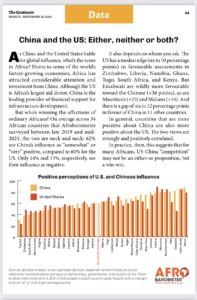As Sudan’s popular revolt surged from late 2018, threatening to topple President Omar Hassan al-Bashir’s government, he received a memo urging the government to run a social media campaign and even to publicly execute a few protesters as a warning to others, writes New York Times Chief Africa correspondent
[The memo came from] the Wagner Group, an opaque network of Russian mercenaries, mining companies and political influence operations — controlled by a close ally of President Vladimir V. Putin of Russia — that is expanding aggressively across a swath of Africa….
 This memo and other documents were obtained by the Dossier Center, which is financed by Mikhail B. Khodorkovsky, a former oil oligarch and a longtime nemesis of Mr. Putin’s. Through interviews with officials and business leaders in Sudan, The New York Times confirmed key information in the documents, which the Dossier Center said were provided by sources inside the Prigozhin organization.
This memo and other documents were obtained by the Dossier Center, which is financed by Mikhail B. Khodorkovsky, a former oil oligarch and a longtime nemesis of Mr. Putin’s. Through interviews with officials and business leaders in Sudan, The New York Times confirmed key information in the documents, which the Dossier Center said were provided by sources inside the Prigozhin organization.
“Russia feeds off kleptocracy, civil wars and internecine conflicts in Africa, filling vacuums where the West is not engaged or not interested,” said Samuel Ramani of the Royal United Services Institute, a defense research group in London, and the author of a forthcoming book on Russia in Africa.
In developed countries, a sizeable portion of China’s influence operations are meant to gain access to scientific knowledge and advanced technologies, in particular to support China’s military modernization needs, notes Nadège Rolland, Senior Fellow for Political and Security Affairs at the National Bureau of Asian Research.
 In Africa, Beijing’s sharp power does not seem to be as much about extracting strategic knowledge transfers as it is about spreading its governance model. Over the long term, the cumulative effect of China’s assiduous influence efforts, training programs, elite capture, and information control may not only translate into official African support for Beijing’s policies but also enable the incremental transformation of Africa’s political landscape in ways that reflect the principles and preferences of the CCP regime, she writes in an NBR report, “Political Front Lines: China’s Pursuit of Influence in Africa.”
In Africa, Beijing’s sharp power does not seem to be as much about extracting strategic knowledge transfers as it is about spreading its governance model. Over the long term, the cumulative effect of China’s assiduous influence efforts, training programs, elite capture, and information control may not only translate into official African support for Beijing’s policies but also enable the incremental transformation of Africa’s political landscape in ways that reflect the principles and preferences of the CCP regime, she writes in an NBR report, “Political Front Lines: China’s Pursuit of Influence in Africa.”
As observed in Western democracies, political influence activities can take many forms, Rolland adds, including:
- “routine cultural diplomacy to purchasing political favors and silencing critics”[1];
- “securing access to strategic information and resources”[2];
- “repurposing” democratic structures as tools serving the CCP’s policies[3]; and
- “increasing the CCP’s political influence, interfering in the Chinese diaspora, suppressing dissident movements, building a permissive international environment for a takeover of Taiwan, intelligence gathering, encouraging investment in China, and facilitating technology transfer.”[4]
The scope of united front work has evolved to keep up with the CCP’s varying priorities, but its main task and basic framework remain unchanged, she notes. Put simply, it seeks to form tactical alliances to engineer an environment that is favorable to the advancement of the party-state’s goals, while marginalizing and neutralizing those who may stand in its way. RTWT
Africans appreciate China’s economic role but prefer democracy and freedom to authoritarianism, according to a special report from The Economist.  A survey of 34 African countries last year by Afrobarometer, a research group and National Endowment for Democracy (NED) partner, found that 63% of respondents felt China had a “very” or “somewhat” positive influence—more than the 60% who said the same of America. Polls in seven African countries for The Economist by Premise, conducted in April, found a similar result. In every country more respondents felt that China had a “good” than a “bad” influence, it observes.
A survey of 34 African countries last year by Afrobarometer, a research group and National Endowment for Democracy (NED) partner, found that 63% of respondents felt China had a “very” or “somewhat” positive influence—more than the 60% who said the same of America. Polls in seven African countries for The Economist by Premise, conducted in April, found a similar result. In every country more respondents felt that China had a “good” than a “bad” influence, it observes.
The normalization of Putin’s brazen attempt to violate Ukraine’s territorial integrity risks incentivizing the violent contestation of Africa’s many disputed borders, argue Vanguard Africa’s Jeffrey Smith Joseph Siegle, Director of Research at the Africa Center for Strategic Studies. A culture of impunity internationally will, likewise, embolden more repression domestically, they write for Foreign Policy in “Putin’s World Order Would Be Devastating for Africa.”
German MEP Reinhard Bütikofer asks, “What is the European Commission doing to counter Russian lies and false narratives about Ukraine’s grain exports?” and proposes that Commission President Ursula von der Leyen send an emissary to Africa.
Autocratic ‘genderwashing’
Autocrats have long understood the value of touting their “democratic” bona fides. Their latest innovation is using gender reforms toward autocratic ends. @elinbja and @zetterberg_par unpack “autocratic genderwashing”… https://t.co/awEJ2vfVca @ForeignPolicy
— Journal of Democracy (@JoDemocracy) June 6, 2022
What is European commission doing to counter Russian lies and false narratives about UKR grain exports, @vonderleyen? Why not send an emissary to Africa? https://t.co/Hv5VZZsUeU
— Reinhard Bütikofer (@bueti) June 6, 2022







